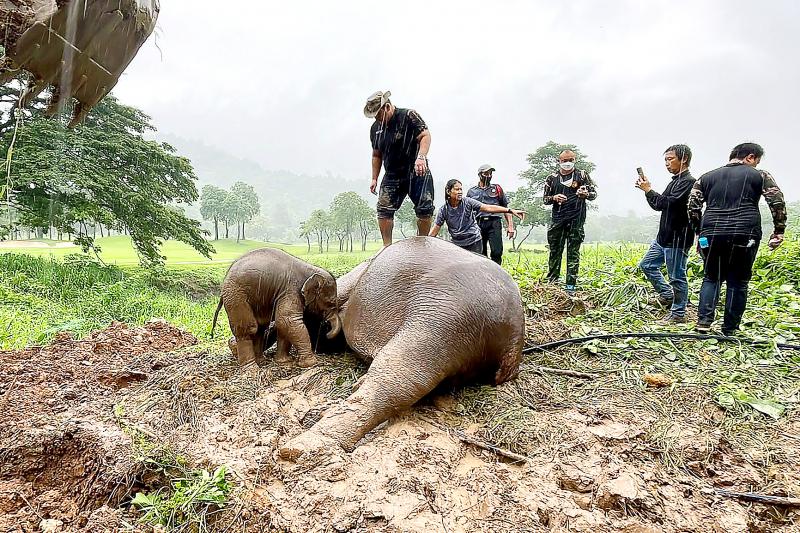Orphaned elephants manage to overcome the loss of their mother by living in a herd, highlighting the importance of a social life for the species, according to a study.
Scientists investigated the consequences of a mother elephant’s death on her child by examining the level of stress hormones in the excrement of 37 young elephants in Kenya between 2015 and 2016.
Among the young elephants, 25 had lost their mother between one and 19 years before from poaching or drought.

Photo: AFP
Of the 25 orphans, 20 stayed within the same family unit after the mother’s death, while five joined an unrelated group.
The researchers found that stress hormones were at similar levels in the long term among orphans and the other elephants, even though the former were expected to show more stress symptoms in the absence of maternal care.
Any stress among the orphans did not last long, showing their “resilience” and the effect of social support from the other elephants, said Jenna Parker, the main author of the study published this week in the journal Communications Biology.
The importance of family links was obvious when observing elephant herds, Parker said.
The young rarely stray more than 10 meters away from their mother and “incredible” reunions involving the entire group were seen after a few hours of separation, said the researcher at Colorado State University in the US.
When poachers or hunters kill an elephant, that social cohesion disintegrates and threatens the group’s wellbeing, particularly the young ones left orphaned, she said.
The bond between a baby elephant and its mother is believed to be strong even after weaning.
‘PLAYMATES’
Parker and her colleagues investigated how orphaned elephants felt by measuring the quantity of hormones they release when faced with stress.
The hormones can be found in blood, saliva, urine and faeces. The last option was chosen as the most reliable and widespread way to measure stress in wild animals because it is non-invasive, Parker said.
Only the excrement of young females aged between two and 20 in the Samburu and Buffalo Springs reserves in northern Kenya was used, with males less easy to track because they are less attached to their original herd.
Scientists also found lower stress levels among young elephants growing up in groups with more animals of a similar age, suggesting that “playmates” are essential for them.
The results could guide orphanages to provide companions of the same age to help orphaned elephants.
The study also concluded that releasing groups of orphaned elephants together after they were linked during captivity could facilitate their transition to living in the wild.

Many people noticed the flood of pro-China propaganda across a number of venues in recent weeks that looks like a coordinated assault on US Taiwan policy. It does look like an effort intended to influence the US before the meeting between US President Donald Trump and Chinese dictator Xi Jinping (習近平) over the weekend. Jennifer Kavanagh’s piece in the New York Times in September appears to be the opening strike of the current campaign. She followed up last week in the Lowy Interpreter, blaming the US for causing the PRC to escalate in the Philippines and Taiwan, saying that as

Nov. 3 to Nov. 9 In 1925, 18-year-old Huang Chin-chuan (黃金川) penned the following words: “When will the day of women’s equal rights arrive, so that my talents won’t drift away in the eastern stream?” These were the closing lines to her poem “Female Student” (女學生), which expressed her unwillingness to be confined to traditional female roles and her desire to study and explore the world. Born to a wealthy family on Nov. 5, 1907, Huang was able to study in Japan — a rare privilege for women in her time — and even made a name for herself in the

This year’s Miss Universe in Thailand has been marred by ugly drama, with allegations of an insult to a beauty queen’s intellect, a walkout by pageant contestants and a tearful tantrum by the host. More than 120 women from across the world have gathered in Thailand, vying to be crowned Miss Universe in a contest considered one of the “big four” of global beauty pageants. But the runup has been dominated by the off-stage antics of the coiffed contestants and their Thai hosts, escalating into a feminist firestorm drawing the attention of Mexico’s president. On Tuesday, Mexican delegate Fatima Bosch staged a

Taiwan can often feel woefully behind on global trends, from fashion to food, and influences can sometimes feel like the last on the metaphorical bandwagon. In the West, suddenly every burger is being smashed and honey has become “hot” and we’re all drinking orange wine. But it took a good while for a smash burger in Taipei to come across my radar. For the uninitiated, a smash burger is, well, a normal burger patty but smashed flat. Originally, I didn’t understand. Surely the best part of a burger is the thick patty with all the juiciness of the beef, the